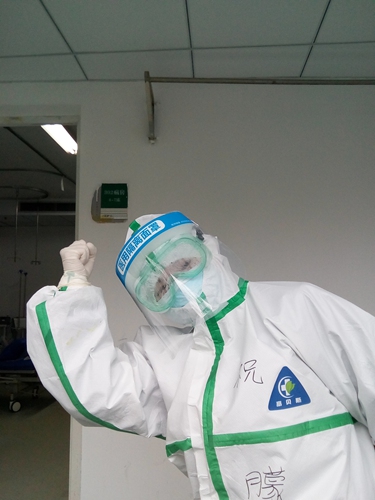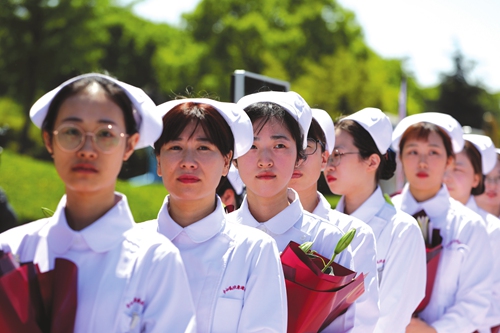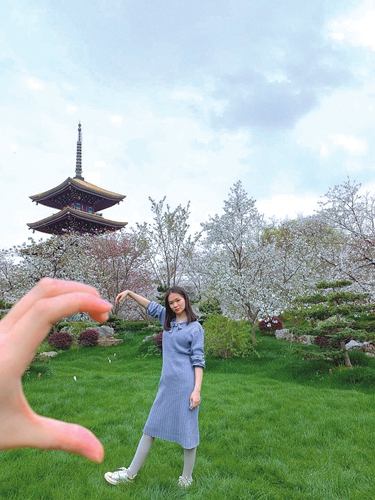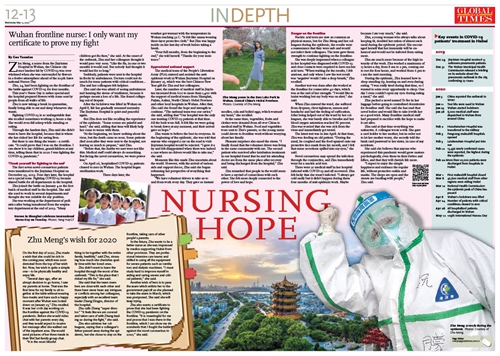Wuhan frontline nurse: I only want my certificate to prove my fight

Zhu Meng at work during the epidemic Photos: Courtesy of Zhu Meng
Zhu Meng, a nurse from the Jinyintan Hospital in Wuhan, the Chinese city once hardest hit by COVID-19 was overwhelmed when she was surrounded by flowers in a festive atmosphere ahead of the 109th International Nurses Day.
Zhu, 24, had been fighting on the frontline of the battle against COVID-19 for four months.
This year's Nurse Day is rather special and the hospital prepared flowers with some sent by people from all walks of life.
Zhu is now taking a break in quarantine, finally being able to eat and sleep whenever she wants.
Fighting COVID-19 is so unforgettable that she recalled sometimes working 13 hours a day. She would even fall asleep while standing or eating.
Through the hardest days, Zhu said she didn't want to leave the hospital, because that is where she has risked her life for saving lives.
But there is one thing she wants - a certificate. "It could prove that I was on the frontline. I can show it to my children, grandchildren at any time, telling them that in 2020 I was fighting the COVID-19 pandemic."
'Thank yourself for fighting to the end'
The first seven novel coronavirus patients were transferred to the Jinyintan Hospital on December 29, 2019. Four days later, the hospital set a special zone. Fighting COVID-19 became shared battle for all departments in the hospital.
Zhu joined the battle on January 4 as the first batch of medical staff in the hospital. She said she used to work in several departments and thought she was suitable for any position.
She was working at the department of pediatrics after being transferred from the respiratory department at the end of 2019. "Many children got flu then," she said. At the onset of the outbreak, Zhu and her colleagues thought it would pass very soon. "Like the flu, in one or two months it would end. But nobody had thought it would last for so long."

Photo: IC
Suddenly, patients were sent to the hospital in flocks by ambulances. Doctors could not do much for some patients with critical conditions… Zhu and her colleagues felt helpless.
Zhu said she was afraid of seeing ambulances and hearing the sirens of ventilators, because it perhaps meant a loss of a life. She feared collapsing out of despair.
After the lockdown was lifted in Wuhan on April 8, life has gradually resumed normalcy. The Jinyintan Hospital is quiet and peaceful again.
But Zhu does not like recalling the experience of the epidemic. "Some scenes are painful and hard," she said, adding that time will likely help her come to terms with them.
"At the beginning, we knew nothing about the virus, but the death came so soon. Some patients died soon after they were sent to the hospital, not leaving us much to prepare," said Zhu.
"Before that, the deaths we met were not like this. Medical staff could always do something. But facing the novel coronavirus, we were powerless."
On April 26, hospitalized COVID-19 patients cleared to zero in Wuhan. The hospital began sterilization work.
Three days later, the weather got warmer with the temperature in Wuhan reaching 32 C. "It felt like sauna wearing three-layer protective cloth." But Zhu was happy inside on her last day of work before taking a break.
"Four full months, from the beginning to the end," she told herself. "Thanks for your insistence."
Appreciated national support
The medical team of the People's Liberation Army (PLA) entered and assisted the anti-epidemic work in Wuhan Jinyintan Hospital on January 25, which was the best Chinese New Year gift for Zhu and her colleagues.
Later, the number of medical staff in Jinyintan increased from 600 to more than 1,400 with the support of medical teams from Shanghai, Fujian, Anhui, North China's Hebei Province and other local hospitals in Wuhan. After that, Zhu said she found the hope and strength to continue. "The national team was our savior," she said, adding that "Our hospital was the only one treating COVID-19 patients at that time. All the beds were full. It felt like we were going to break down at any moment, and their arrival gave us hope."
Zhu wants to believe the best in everyone. At the beginning of the epidemic, she was told that anyone who stopped a car on the road to visit Jinyintan hospital would be rejected. "I gave it a try and felt disappointed when there was indeed a case where no drivers would like to take me," she said.
Moments like this made Zhu uncertain about the world. However, with the arrival of various aids and support forces, Zhu said she began reframing her perspective of everything that happened.
"We have volunteer drivers to take us to and from work every day. They gave us instant noodles, cola and boiled eggs, which warmed my heart," she recalled.
At the same time, vegetables, fruits and clothes were donated from all over China to medical staff in Wuhan. Food and vegetables were sent to Zhu's parents, so the young nurse could devote to frontline work without worrying about her family.
Pleasant surprises also eased the stress. "I finally found that the volunteer driver was living in the same community with me. The second patient who survived after intubation treatment in our hospital found that he and his attending doctor are from the same place after recovery and being discharged from the hospital," Zhu said.
Zhu remarked that people in the world seem to have a myriad of connections with each other. She felt more deeply connected to the power of love and hope.
Danger on the frontline
Nucleic acid tests are now as common as physical exams, but for Zhu Meng and her colleagues during the epidemic, the results were a reassurance that they were safe and would not infect their colleagues. The tests gave them strength to continue fighting on the frontline.
She was deeply impressed when a colleague in her hospital was diagnosed with COVID-19 and close contacts were required to have nucleic acid tests. "When waiting for the results, I felt anxious, and only when I saw the test result was 'negative' would I take a deep breath," Zhu recalled.
Another test was done after she worked at the frontline for consecutive 40 days, which was at the end of her strength. "I would like to insist working but my body was on alert," she said.
When Zhu entered the ward, she suffered from dyspnea, chest tightness, nausea and headache and had the feeling of suffocation. After being helped out of the ward by her colleagues, she was barely able to breathe and her blood oxygen saturation reached 86 percent. Zhu was worried that she was sick from the virus and immediately got tested.
The latest test was in late April. At that time, Zhu was feeding an old patient. "During the meal, he coughed and the food sprayed onto my protective face mask from his mouth, and I felt that some secretions spilled into my eyes," she said.
Novel coronavirus may spread the infection through the conjunctiva, and Zhu immediately went for a nucleic acid test.

Nurses in Shanghai celebrate International Nurse Day on Tuesday. Photos: Yang Hui/GT
There were 21 medical staff in her hospital infected with COVID-19 and all recovered. Zhu felt lucky that she wasn't infected. "I always get cold easily but it didn't happen during these four months of anti-epidemic work. Maybe because I ate very much," she said.
Zhu, a young woman who always talks about keeping fit, doubled her ration of almost each meal during the epidemic period. She encouraged herself that her immunity will be enhanced and would not be infected from eating more.
Zhu ate much more because of the high intensity of the work. Zhu worked a maximum of 13 hours a day, from 8 am to 2 pm, coming out to rest for four hours, and worked from 6 pm to 1 am the next morning.
During the epidemic, Zhu learned how to sleep standing up, leaning on and even during eating. "I was really tired during that time, so I wanted to seize every opportunity to sleep. One day I even couldn't open my eyes during eating a meal," she said.
Zhu packed a novel named To live in her luggage before going to centralized dormitories for frontline staff. She said she has read that novel before and would like to take it with her as a good wish. Many frontline medical staff had prepared to sacrifice with the hope to make it out alive.
Zhu said at that time everything was unknown. A colleague wrote a will. She gave a card holder to her mother, but in order not to let her mother worry, she secretly told the bank card password to her sister, in case of any accidents.
She said she believes that anyone who experienced this pandemic would grow mature psychologically, even those in their forties and fifties, and that they will cherish life more.
"I expect to enjoy the simple happiness and embrace the regular life, without protective outfits and masks. The shops are open and the streets are bustling with people," Zhu said.

Zhu Meng poses in the East Lake Park in Wuhan, Central China's Hubei Province. Photos: Courtesy of Zhu Meng
Zhu Meng's wish for 2020
On the first day of 2020, Zhu made a wish that she could be rich in the coming year, which was soon demoted from the top of her wish list. Now, her wish is quite a simple one - to be physically healthy and enjoy life.
"Several days ago, after an abrupt decision to go home, I saw my parents at home. That was the first time for my family to sit together at the table without wearing face masks and have such a happy moment after Wuhan was locked down on January 23," Zhu recalled. It was her 111th day working on the frontline against the COVID-19 pandemic. Before she would video chat with her parents every day, and they would expect to receive her message after she walked out of the inpatient area. She would send pictures of her three meals in their WeChat family group chat.
"It is the most blissful thing to be together with the entire family, healthily," said Zhu, stressing how much she cherishes quality time with her loved ones.
Zhu didn't want to leave the hospital through the worst of the outbreak. "This is the place that I risked my life for," she said.
She said that the team members are close with each other and there have never been any intrigues or conflicts among her colleagues, especially with an excellent team leader Zhang Dingyu, director of the hospital.
Zhu calls Zhang "super director." "It feels like we are covered and taken care of with Zhang leading us during the fight," she said.
Zhu also admires her colleagues, saying that a colleague's father passed away during the epidemic, but she chose to stay on the frontline, taking care of other people's parents.
In the future, Zhu wants to be a better nurse as she was impressed by medics supporting Hubei from other provinces. They are professional intensive care teams and skilled in using all the equipment for severe patients such as ventilators and dialysis machines. "I must study hard to improve myself in aiding and caring severe and critical patients," she said.
Another wish of hers is to pass the exam which enlists her to the government payroll as she planned to take the exam in March, which was postponed. She said she will keep trying.
Zhu also wants a certificate to prove that she had been fighting the COVID-19 pandemic on the frontline. "It is meaningful for me and proves that I was there in the frontline, which I can show my descendents that I fought the battle against the novel coronavirus in 2020," she said.
Key events in COVID-19 patients' treatment in Hubei
2019
Dec 29 Jinyintan Hospital received 15 unknown pneumonia patients
Dec 31 The Wuhan Municipal Health Commission released a briefing on its website about the pneumonia outbreak in the city, confirming 27 cases
2020
Jan 3 China reported the outbreak to WHO
Jan 11 Test kits were used in Wuhan
Jan 23 Wuhan started lockdown
Jan 28 6,000 medical staff were dispatched to Wuhan from around China
Feb 2 Huoshenshan Hospital was transferred to the military
Feb 3 Fangcang makeshift hospitals opened
Feb 5 Leishenshan Hospital put into use
Feb 12 13,436 newly confirmed cases were reported, the highest during the epidemic
Feb 20 More than 10,000 patients were discharged from hospitals in Hubei
Mar 1 First makeshift hospital closed
Mar 8 42,600 medical staff from other regions were aiding Hubei
Mar 12 National Health Commission: the epidemic peak of China has passed
Apr 8 Wuhan's lockdown was lifted
Apr 24 Number of patients with critical conditions cleared to zero
Apr 26 All hospitalized patients discharged in Wuhan
May 12 109th International Nurses Day

GT